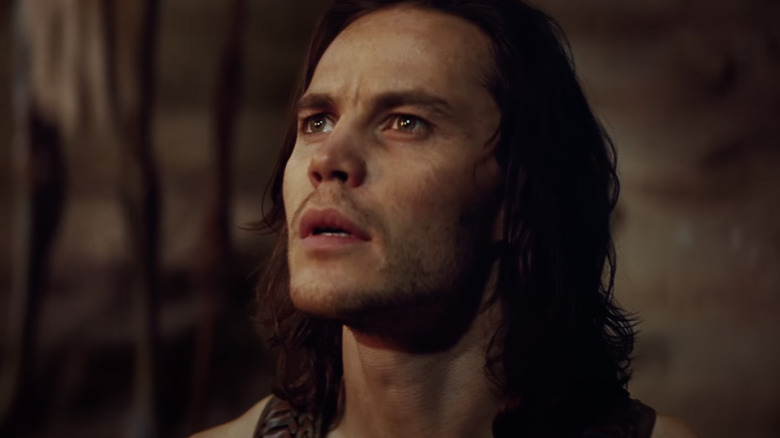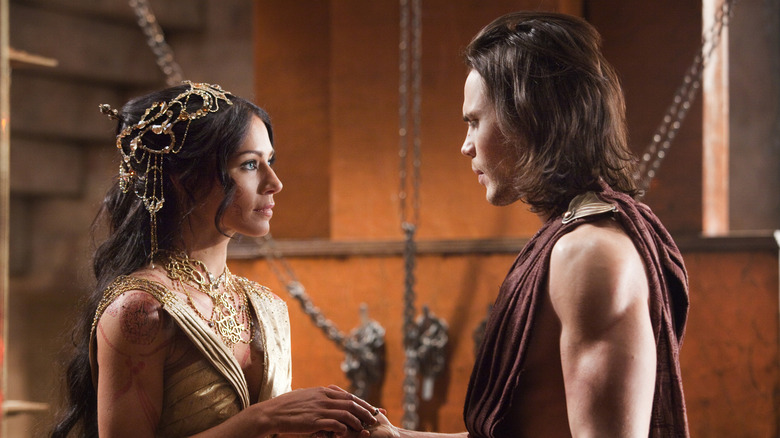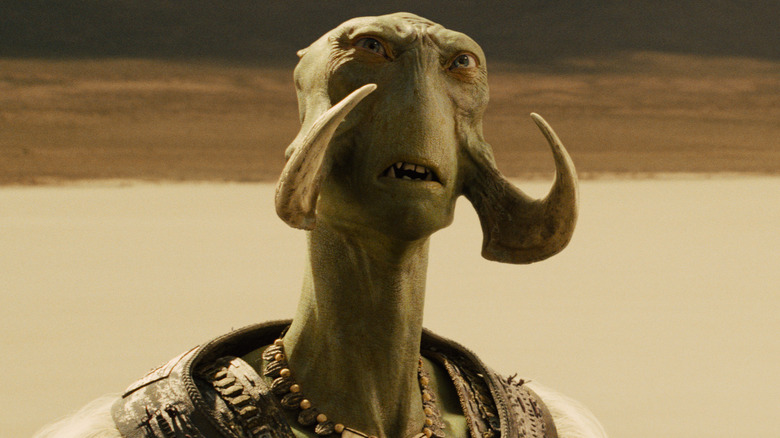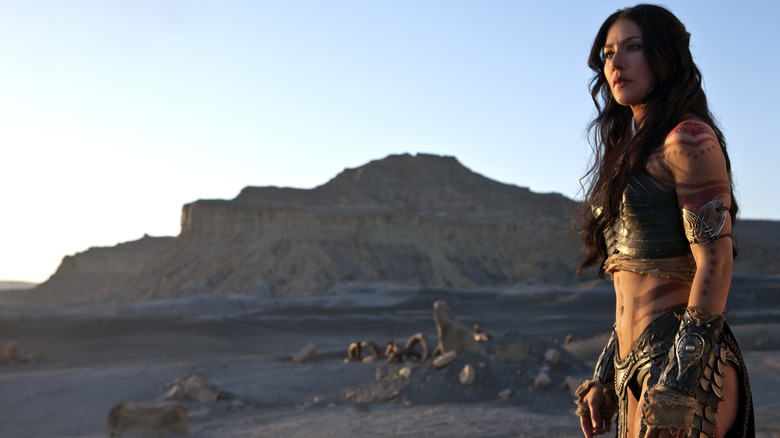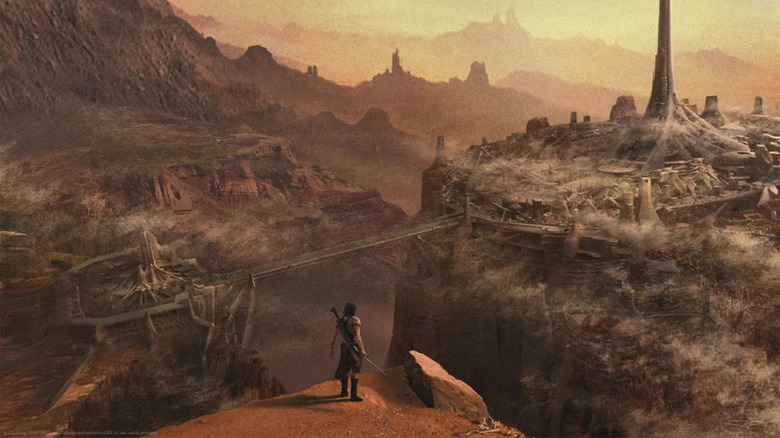Why John Carter Bombed At The Box Office, And What We Can Learn From It
In 2012, Disney was getting ready to make its biggest franchise play ever with "The Avengers," a film that saw several different individual film franchises crossover with one another to form something greater. This had never been done before in the cinematic space, at least not on this scale. While that movie went on to become a $1.5 billion hit that has defined the following decade of blockbuster filmmaking, it wasn't really Disney's biggest franchise play that year.
Unfortunately for "John Carter" and everyone involved, the bigger play didn't pan out as anyone had hoped.
Rather, "John Carter" went down as one of the most notorious flops in Hollywood history, costing the studios hundreds of millions of dollars. So, what exactly went wrong? How is it that Disney, a studio that has been notoriously good at handling franchises in the modern era, let this get so out of hand? The answer is simple (at least on the surface), with some more nuanced elements worth examining.
A franchise for franchise's sake
"John Carter" was directed by Andrew Stanton, who had previously made the Oscar-winning Pixar films "WALL-E" and "Finding Nemo." But he had his sights set on a gigantic, live-action sci-fi franchise based on the works of Edgar Rice Burroughs, seeking to adapt his "John Carter of Mars" series of novels for the big screen on the largest scale imaginable. These books date back to 1911, meaning that at the time of the movie's release, the tales were more than 100 years old. Many roots of our most beloved science fiction stories can be traced back to the work of Burroughs, making an adaptation of these stories an appealing prospect. Especially for a company like Disney, which has the ability to squeeze all of the juice out of a franchise with theme park opportunities, spin-offs, merchandise, and everything in-between.
Unfortunately, given that the novels were roughly a century old, many people in the general public didn't care much about "John Carter of Mars," if they were aware of it at all. But around this time, Hollywood was truly doubling down on its obsession with franchises to get an edge in the marketplace, and Disney's own Marvel Cinematic Universe was leading the way. This was an example of looking at intellectual property in and of itself as worthy of a big-budget franchise simply because it would be based on something. As we would learn, the degree to which Burroughs' name and his famed literary hero would be able to put meat in seats was very minimal at best, and, at worst, almost nonexistent.
A gigantic, overinflated budget
The most important thing to understand about flops versus hits at the box office is that it's all relative. A horror film like "Get Out" can become a gigantic hit with $255 million because it cost less than $5 million to produce (before marketing). It all boils down to return on investment. And that is where the biggest problem comes into play for "John Carter." Stanton's ambitious film, which starred Taylor Kitsch as the titular hero, ended up with an overinflated, unmanageably huge budget that makes it one of the most expensive films ever made. The film cost Disney a staggering $263.7 million to make. The most shocking thing about that figure is that it was originally $307 million but, thanks to some tax credits in the U.K., the actual cost came down by nearly $45 million.
When a budget gets that high, it becomes almost impossible to recoup that money theatrically. Disney also had to spend an incredible amount of money to market the film. As a general rule of thumb, studios only see about half of what is made in ticket sales, and that amount can be even less in some international territories such as China, where only about 25% of that money makes it back to the studio. With that in mind, when accounting for the marketing spend (likely $100 million if not much more), Disney probably needed $700 million or more just to have a hope of breaking even. Honestly, that number is probably a lot closer to $800 million.
Even if we're generous with the numbers, that gargantuan budget created a steep uphill battle. The movie only made $282.7 million worldwide, including a disastrous $30 million opening weekend in the U.S. The writing was on the wall the second the movie hit theaters on March 9, 2012. So, Disney lost at least $200 million almost overnight and the very ambitious sequels that Stanton hoped to make would never come to pass.
Lukewarm reception
Even in the best case scenario, once Disney spent all that money it was going to be almost impossible to recoup it. What hurt matters even more is that "John Carter" was not a best-case-scenario in terms of how it was received. Critics were divided on the film — it currently holds a pretty poor 52% approval rating on Rotten Tomatoes. Theatergoers didn't overwhelmingly disagree, with the audience score sitting at a lukewarm 60%. Sure, people have gone on to discover the film in the years since its disastrous release and it has become a cult classic of sorts. But at the time, there wasn't enough positivity around it to generate word-of-mouth buzz that would have led to more robust ticket sales.
We need look no further than the direct competition out around that time to understand that this was just a movie general audiences were not that interested in. In its opening weekend, "John Carter" placed second to "The Lorax," an animated film based on the book by Dr. Seuss. The horror/thriller "Silent House" and comedy "A Thousand Words" were the only other new releases that weekend, and they didn't fare well enough to reason that moviegoers were overburdened with choice. Heck, even in terms of other action/adventure titles around that time, "Journey 2: The Mysterious Island" placed number 10 on the charts that weekend, meaning it certainly wasn't getting in the way of Disney and Stanton's mega-budget gamble.
It all comes back to creating insurmountable odds that the movie simply could not contend with.
The lessons contained within
In looking back on the failure of "John Carter," that budget sticks out like a sore thumb. Disney and other studios make big-budget movies all the time, but when playing in those sandboxes, the key is to not let things get out of hand. Especially when dealing with a property that doesn't come with as much guarantee. Did it help that the movie ended up with a bland title like "John Carter" that may not have indicated to audiences that a big sci-fi spectacle was on the table? Maybe not, but it would be tough to say one could have justified that budget even with a much better title.
This all comes back to being responsible and not overspending when it simply isn't necessary. The "Jurassic World" trilogy has grossed billions at the box office and all those films were produced for less than $200 million. Even the Marvel Cinematic Universe movies, with the exception of "Avengers: Infinity War" and "Avengers: Endgame," generally try to keep it to $200 million or less, and those are about as close to guaranteed hits as anything. So, exceeding that by more than $100 million (before the tax credits) is downright irresponsible. The movie business is a business, and on paper, that is just bad business.
